- HOME
- Ecommerce operations
- What makes a good ecommerce platform
What makes a good ecommerce platform
An ecommerce platform is designed to take care of your entire online business—from the front-end ecommerce website to the back-end management of operations. Every platform comes with its unique set of features, so choosing one over another can get confusing.
In this article, we talk about all the essential features that your ecommerce platform should support so that you can delight your customers, boost conversion rates, keep operations efficient, and focus on building your brand and revenue
We will also discuss how Zoho Commerce meets every challenge that as a seller, you might come across while setting up an efficient ecommerce store.
A comprehensive product catalog
Whether you wish to sell 10 products or a thousand, you need a product catalog that is easy to update. Scalability is also important—you should be able to regularly add products with the same convenience you did on day one. As your business grows, the product catalog should still meet your requirements. The catalog should also meet the specific requirements of your product line. For instance, if you are a clothing store owner, you should be able to define attributes such as color and size. Furthermore, every product needs a detailed description and images to sell it efficiently. Features that indicate if an item is on sale or eligible for return is always good to have as it gives customers an incentive to make a purchase.
Zoho Commerce allows you to categorize your products while displaying them on your online store. This makes it easy for your customers to find exactly what they are looking for. To see this in action, visit Bella, who’ve managed to create one of the most easily accessible product catalogs using Zoho Commerce. They have over 750 products that have been perfectly arranged on their website.
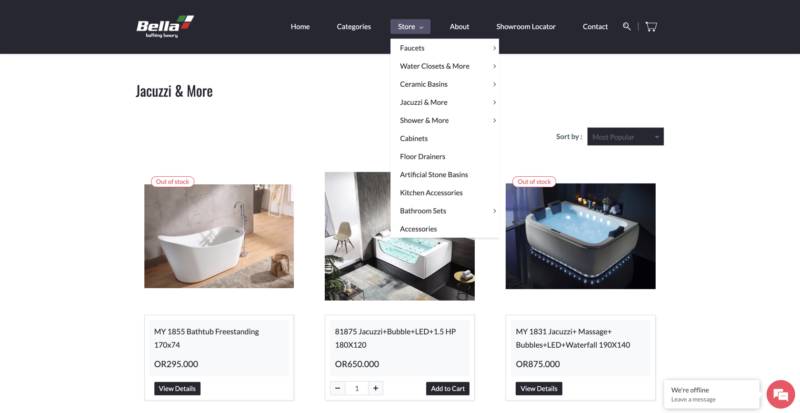
Tip: An easy-to-use platform will always let you make corrections quickly. If editing is complicated, you’ll put off making changes, which will result in communicating poor quality information to your customers.
Seamless order management
Inventory tracking is an important feature so you always know what’s in stock, know what needs to be refilled, and can track orders en route to customers. This is non-negotiable, for if you don’t know what’s in your inventory, you run the risk of losing customers. Customers who placed orders to find out that their orders have been canceled due to out of stock issues will not come back to shop at your store again. If you have a return policy, managing those returns, checking their condition, and initiating an exchange or refund are aspects that your ecommerce platform will also need to accommodate.
Zoho Commerce’s order management dashboard allows you to see all your orders along with their status. This means you can easily filter and track every last order with minimum effort. One-click will fetch you all information related to a particular order.
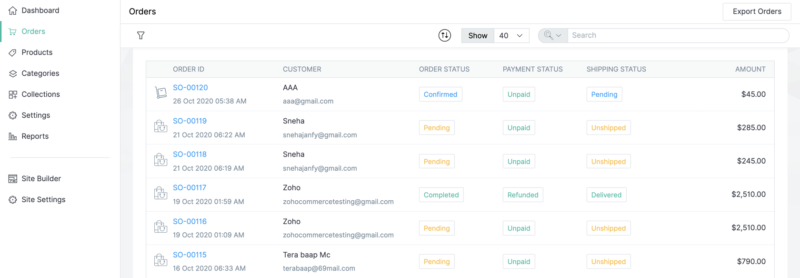
Tip: When you try a demo for potential ecommerce software, always try to build and follow your typical scenario so you know how to handle the different possibilities you’re bound to face during operations.
Multiple payment options
Customers expect convenience when shopping online, and one important aspect of this is to have as many payment options as possible. Your ecommerce solution should support both international and local payment gateways to give customers a wide variety of payment methods to choose from. Bank transfer is an offline payment mode you may want to extend for your line of products as well.
Zoho Commerce believes in giving customers multiple options to pay for their orders. The more options, the fewer chances of cart abandonment at checkout. From Paypal to Razorpay, Forte to Stripe, Zoho Commerce has you covered with most payment gateways from across the globe.
Tip: If there are any payment gateways you need and that are not integrated with Zoho Commerce, please write to presales@zohocommerce.com, and we will help you figure it out!
Shipping and Taxes
Shipping charges and delivery time affects the decision of a customer on whether to proceed with checkout or not from a particular ecommerce store. Built-in API’s with your shipping carrier will help to automatically update order details to the shipping carrier. Once shipping is complete, shipping details should be updated on your ecommerce platform. This way sellers and customers can track the orders seamlessly. Customers prefer free delivery on most orders but sometimes when they are in a time crunch, customers are willing to pay for expedited shipping just to get delivery on the same day.
Taxes vary from country to country. It is essential for your ecommerce platform to have a regularized tax system in place for all the countries where your business is actively functioning. Lack of tax-related information for each order at the end of a fiscal year will only mean a huge loss and extra work for sellers.
Zoho Commerce not only allows you to offer most of the major names across various countries for shipping, it calculates live shipping rates for customers during checkout. This will help you lower cart abandonment rates as customers are spared a surprise during payment. From timely delivery to bulk discounts and offers, having an account with these shipping carriers does come with perks. Sellers have complete freedom to choose between local shipping carriers, store pick-up, and even personal delivery that will suit your business requirements.
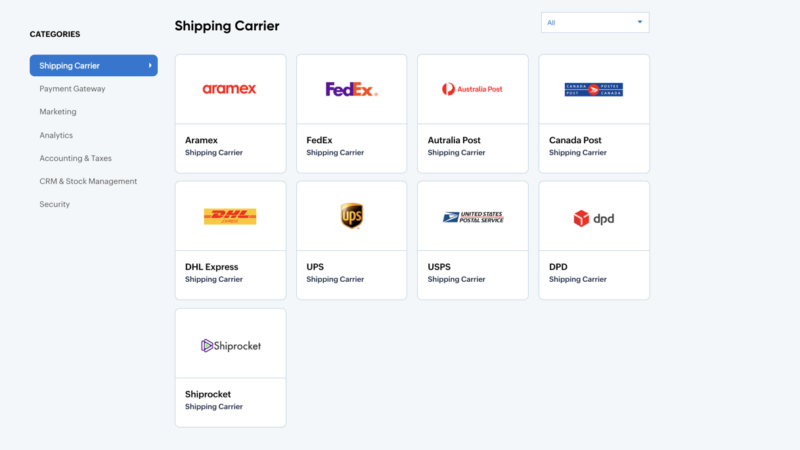
Tip: Associated costs, whether location-specific or delivery-based, should either be displayed on the product page or on a shipping calculator!
A personal account for every customer
To personalize the shopping experience, you’ll need to provide customers accounts with a dedicated login and a user profile. Using this, they can view their order status and order history, manage addresses, return or cancel products, and review purchased items. This makes them feel more connected to your business since they can see past transactions while providing you with detailed insights on the behavior and preferences of each of your registered customers.
Zoho Commerce allows you to create specific accounts for each of your customers. They can then sign in to your store to get a personalized welcome along with personalized product recommendations based on their previous purchases from your store. For example, GoodieGrocer has an easy signup process, and once you become a registered user with them, they provide you free home delivery.
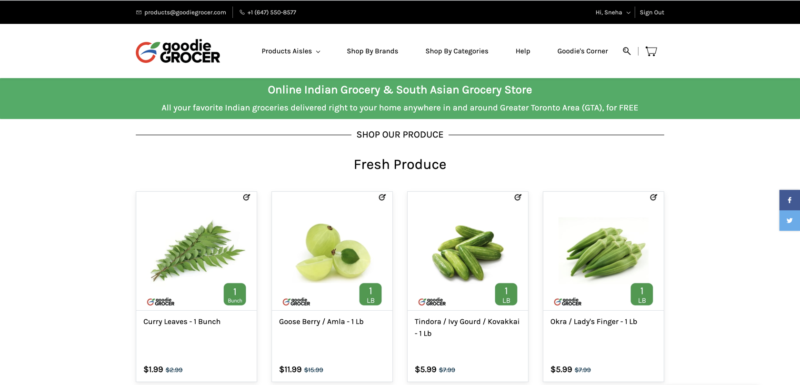
Tip: Zoho Commerce allows you to enable a self-serve customer portal for your customers. Read more about member portals here.
Extensive marketing and SEO capabilities
Look for an ecommerce platform that supports marketing your business with the right features. Your platform should be able to help you boost conversions, run targeted promotions, and recover abandoned carts. It should also be able to personalize marketing by analyzing visitor paths on your website and studying the conversion process. Platforms that offer personalization with product recommendations will mean an instant revenue boost for your website. Testing for small variations (such as color, product placement) on your website usually leads to long-term efficiency.
More common marketing tactics such as customer-specific and time-limited discounts may prompt certain users to purchase faster.
When it comes to SEO, look for a platform that lets you create a sitemap and include metadata for products so you can make your ecommerce website search engine-friendly. This means you will get discovered faster and your brand will get in front of more window shoppers on the Internet. Another great feature is a built-in Schema, which when added to your store will increase the visibility of your products and improve your click-through rate which will help you to increase revenue to your store. It makes you store appears in more Search Engine Results Pages (SERP’s) This is something that not every ecommerce platform might have.
Zoho Commerce understands the importance of SEO for your store and offers a built-in SEO feature on every page you create for your store. You can even include SEO for every product that you add to your store so that individual products can rank organically.
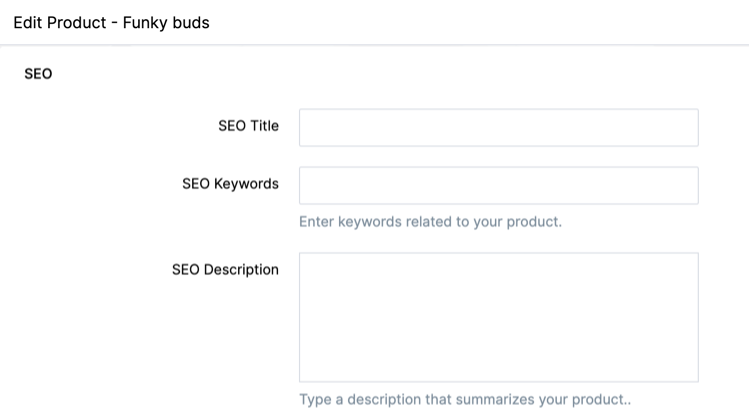
Tip: Check for SEO-specific functions like built-in keyword optimization of meta tags and content. Keyword research based on your customer’s searches and on page SEO’s are some of the basic features that your ecommerce platform solution should offer.
Role Management
You are bound to have different users managing your ecommerce platform at some point, so find a software solution that allows you to define roles for your team. You may want to make one user responsible for tracking inventory, another for publishing blogs, and a third for marketing. All of these different roles will need different access rights. These roles can vary in the system from an administrator to an author or a developer. Your ecommerce software should be able to handle different access rights for each user so you can have better control over who can access what level of information.
Zoho Commerce has two levels of access contribution available. You can allow your employees to help with the working of the store by assigning them specific roles that come with a specific set of restricted actions. They will be called users. You can also allow friends or designers from outside the organization to deal only with the design aspect of your store. They will be called Contributors. This way your store is safe from unauthorized access by people with whom you have shared access.
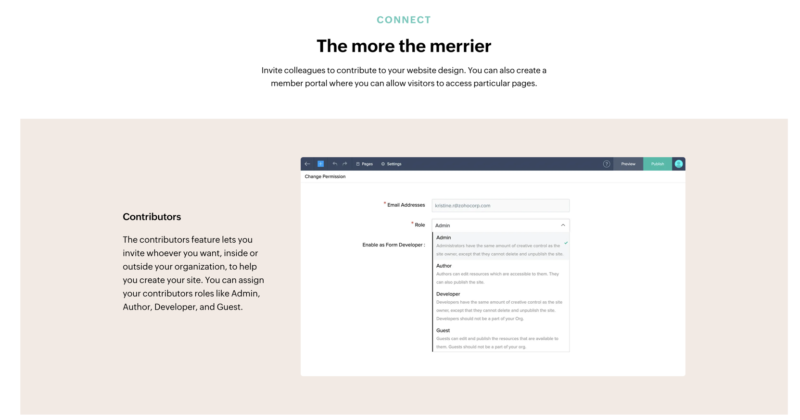
Integrations with other systems
Your ecommerce platform must seamlessly integrate with other systems in your technology ecosystem, including a CRM, an email automation tool, a marketing automation platform, and an accounting platform. It’s important that all the information gathered on your website goes to the right system on the back-end or to the relevant dedicated platform. Without this type of integration, you’ll always be replicating data, missing information, and making costly mistakes.
Zoho Commerce is naturally built into the Zoho ecosystem and supports one-click integration with most Zoho products. If you are already a Zoho One user, your whole business could very well fit onto your lap. Zoho Commerce also easily integrates with renowned third-party integrations to help you build your business empire no matter which ecosystem you choose.
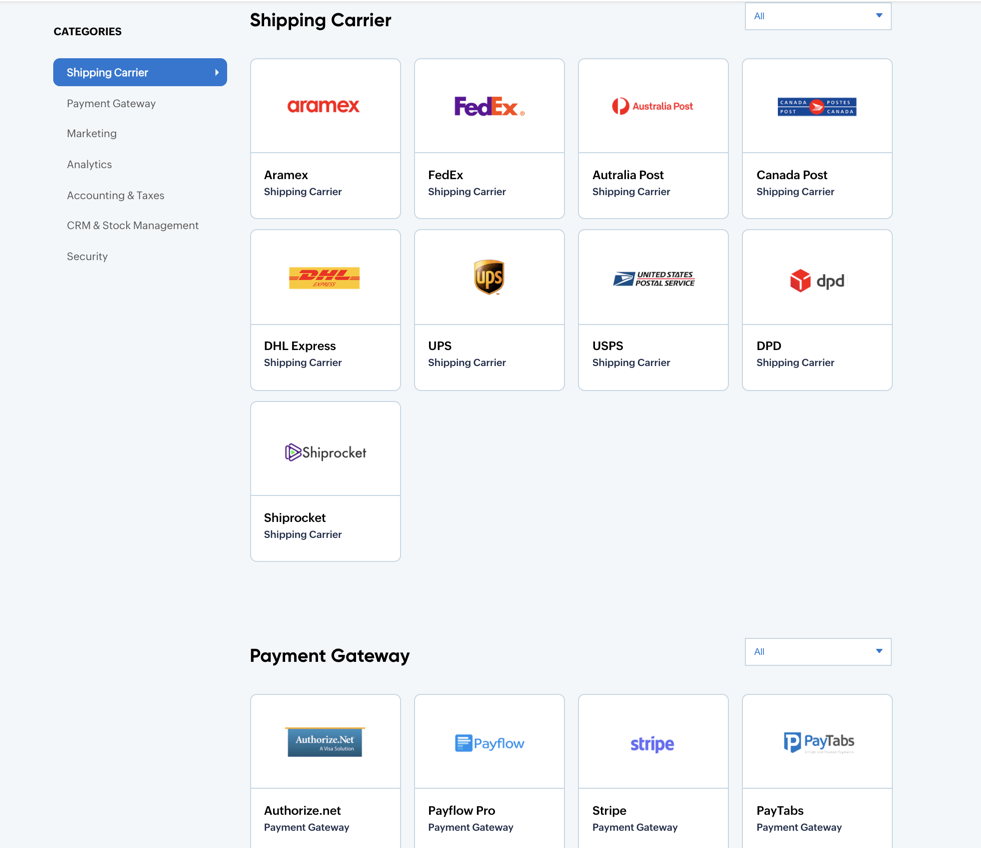
Tip: It’s important to consider the implications of security breach, privacy theft and fraudulent activities that are bound to happen when you try to ‘stitch’ together an ecosystem. Many platforms will provide an ecosystem right out of the box, and you might find that a pre-established ecosystem can help you run your ecommerce business more seamlessly.
Reports and analytics for smart business decisions
With the power of detailed analytics, you can sell more strategically. A great feature provided by ecommerce platforms is the visual representation of data in the form of dashboards, graphs, and charts that are easy to digest and derive information from. Some of the most common metrics that you can track using analytics are:
Sales – by orders, product, product variant, or category
Traffic – overall visits, product pages, and source of traffic
Customers – most frequent visitors and top buyers
Payments – failed payments so you can remind such users
Abandoned cart – frequently abandoned products
Funnel analysis – where are your customers dropping off in their online journey
Zoho Commerce can help you fetch data and generate reports about your store whenever you want. It also integrates with Zoho Analytics to help you get a deeper understanding of your customers and their shopping patterns. Analytics is powered by Zia, Zoho’s very own AI system. She is capable of producing personalized recommendations for each customer based on their browsing history.
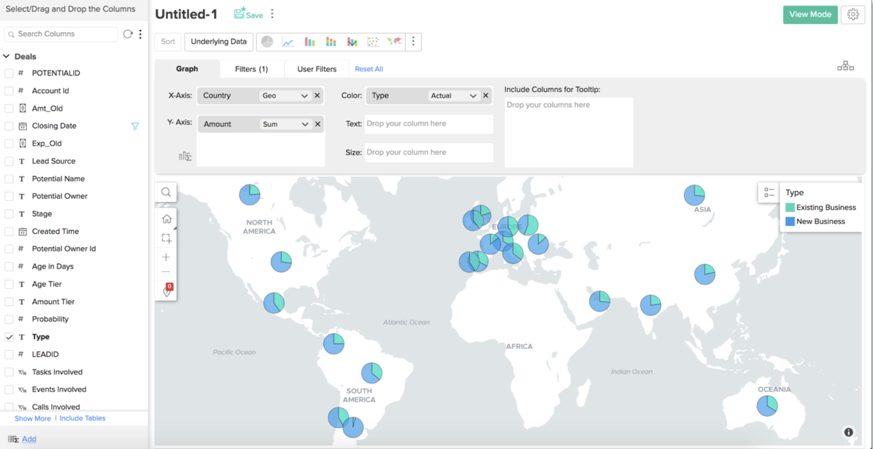
An ecommerce platform is an end-to-end commerce management system designed to leverage technology to make the business a breeze. To run a successful ecommerce business, you need a platform that not only takes care of the operational aspects of your business but also provides you with intelligent features to strategically plan product placement and apply the right marketing tactics. This why we believe that Zoho Commerce is the right ecommerce software to help you scale your business. We will support you as you serve your customers, from pre to post-sales. With the right support structure that spans back-to-front, you can guarantee a great shopping experience to your website visitors so they become loyal customers.
